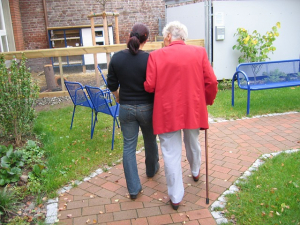“Best Kept Secret” Provides Free Care; Thousands Don’t Know They’re Entitled to Benefits. A Government Program That Saves Money and Works Better Than Anyone Expects… Is That Even Possible?
What can be done about long-term care? You want to stay in your home. You want to care for your spouse. Now, and for all the years to come. Surrounded by family and friends. Comfortable, familiar. But you cannot afford it. What if there was help? Help that did not touch your income. And you can preserve your life savings. What if your security and independence were guaranteed? Too good to be true? No, it’s PACE. The Program of All-inclusive Care for the Elderly. Most who qualify have no idea.
Too good to be true? No, It’s PACE!
Attorney David L. Carrier has supported PACE for over 20 years. “No matter what you’ve been told, take a good look at PACE. Let’s face it, care is expensive, and nobody wants to go to the nursing home anyway. PACE means you don’t have to!” “And PACE is simple: Are you 55 or older? Are you safe at home? Some medical or physical issues? PACE might be just the thing.” Carrier suggested. “It’s surprisingly easy to get what you’ve earned. Even if you’ve been told your finances are a problem, don’t hesitate. New approaches mean that thousands of more families can avoid nursing home poverty.”
PACE is a life saver. Spousal care overwhelms even the most devoted husbands, wives, and children. One study states that “caregivers between the ages of 66 and 96 have a 63% higher mortality rate than non-caregivers of the same age.”
Caregiver spouses sacrifice themselves to keep their loved one at home. And then the institution is inevitable. For single folks, sometimes, it’s their children who decide.
That’s why thousands of your friends and neighbors wind up in institutions. That’s why nursing homes, assisted living facilities, group homes are bursting at the seams. No husband wants his wife “institutionalized.” No wife wishes her husband in the care of strangers. And does anyone want to see years of hard-won savings evaporate overnight?
PACE provides doctors, specialists, pharmacy, physical and occupational therapy, durable medical equipment, supplies, home modifications. In Kent County, a brand-new PACE Day Center has just opened. Expanded options are now available to PACE members.
You do not have to go it alone. You already paid for long-term care through your taxes.
As David Carrier has said, “You don’t have to go it alone! You have already paid for long term care through your taxes. You do not have to pay AGAIN. Free durable medical equipment. Free home alterations. No co-pays. Free transportation. Free physical and occupational therapy. And the list goes on.”
Unlike most government promises, PACE has been even better than anyone expected when it began 50 years ago.



